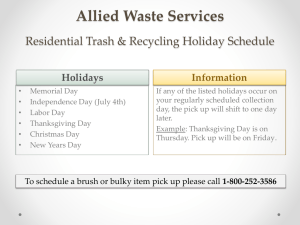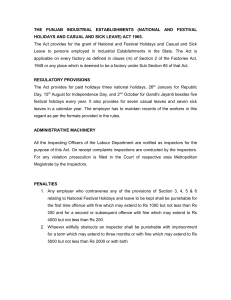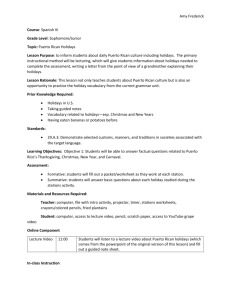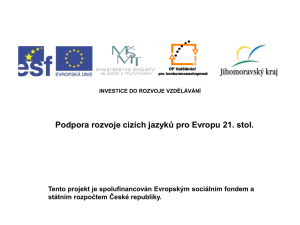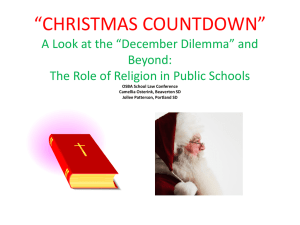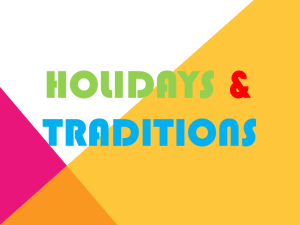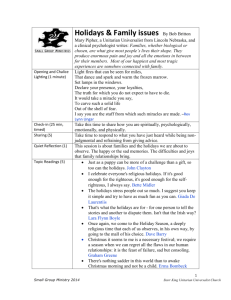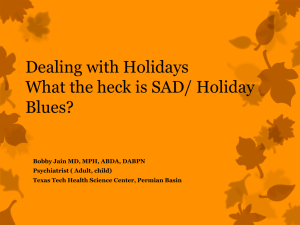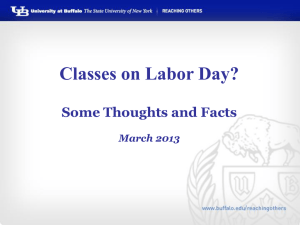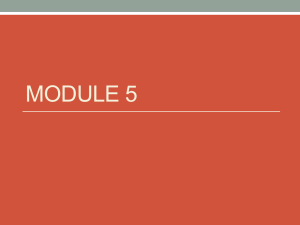Document
advertisement
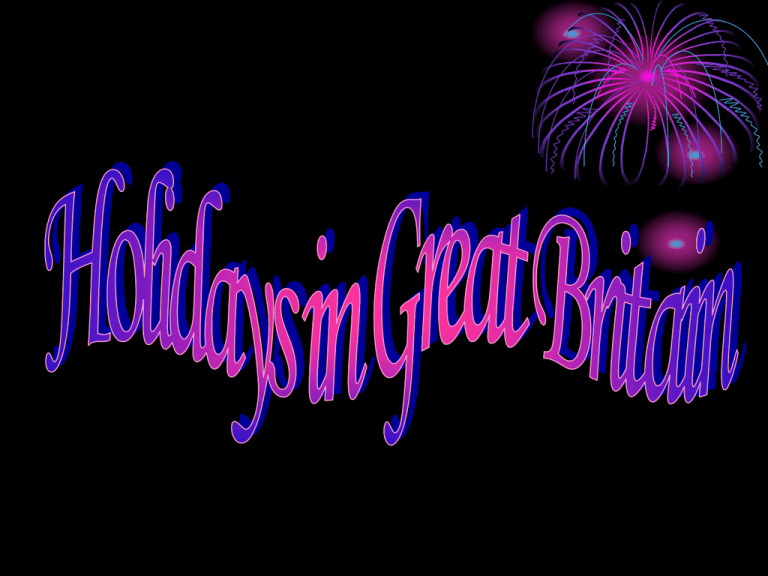
Traditions bring families together and help create ties that bind for a lifetime. They provide inspiration, give birth to memories and establish the uniqueness of a family. Each family creates traditions in its own unique way, while taking part in celebrations that have great symbolic meanings. A tradition can be passed on for generations or it can be established the year the first child is born. A strong sense of family in which rituals and traditions is one of the most evident traits in healthy families. It gives the family a frame. It places it in context historically, linking the past with the future in such a way that members feel part of a larger ethnic or religious family. As your own special holidays draw near, take some time to start your own family customs. These days are filled with commitments, shopping lists and places to be. It’s easy to forget the true meaning of why we gather together. Whether it’s to observe Christmas, Easter or some others festival, we can incorporate into each gathering the gift of a tradition passed down from parent to child, and from friend to friend. There are only six public holidays in Great Britain, that is days on which people do not work. They are: Christmas, Boxing Day, Good Friday, Easter Monday, Spring Bank Holiday and Late Bank Holiday. The New Year’s is also a public holiday in Scotland. All holidays except Christmas and Boxing Day are movable they do not fall on the same day each year. Besides public holidays there are other festival and anniversaries, on which certain traditions are observed, for example, Pancake Day, Bonfire Night, Saint Valentine’s Day, Mother’s Day, etc. But these are not days off. Still, they help to keep many traditions, which Englishmen have always been famous for. St Patrick’s Festival has been in existence since 1996. From a one day celebration it has developed into a 5-day festival, the biggest in Ireland. It takes place in March in Dublin. Carnival of music, street theater, fireworks and dances attract a lot of participants and spectators. The parade has become an essential element of the Festival. In Great Britain, the New Year is not as widely celebrated as Christmas. The most common type of celebration is in a New Year’s Eve party. In Wales and in the north of Britain, almost all children are allowed to stay up until midnight, so that they can left the Old Year out and bring the New Year in. Just before midnight, the ashes are cleared from the fireplace so that the year will begin afresh. Money, especially silver money, is placed outside the door, and bread and a piece of coal are put out there as well to ensure health wealth, and happiness to the household. A few minutes before twelve o’clock all the doors of the houses are opened to allow the spirit of the old year to depart when the clock strikes twelve, everyone wishes everyone else “a happy New Year”. Then toasts, kisses, and handshakes are exchanged, and usually. The rest of the night is spent eating, drinking, singing, and dancing. After midnight many people visit friends and neighbors to celebrate the New Year. There is a funny tradition connected with the New Year: the First Foot. This refers to the first visitor to enter a house on the morning of New Year’s Day. He is welcomed with the warmest hospitality. Traditionally, the First Foot should cross the threshold with a lump of coal and silver coins in his hands to ensure the wellbeing of the family for the coming year. Coal helps to make a fire in midwinter, and there shall never be lack of food and drink during the coming year. The First Foot must be a man because it is believed that if a woman first sets foot in the house, had luck will follow the family throughout the year. It is a good thing everywhere if he is a “tall, dark-haired, and handsome” man. Of course, not everyone goes out: a lot of people stay at home and watch the celebrations on TV. On New Year’s Day, people often make their New Year’s Resolutions, which they usually forget after a few days. Some people ignore New Year’s Eve completely and go to bed at the usually time. There are many holidays in our country. They are the New Year’s the Women’s Day, the Victory Day and etc. These are national holidays when people all over the country do not work and celebrate the holidays. Besides, there have appeared some new national holidays recently: the Christmas in January and the Day of Sovereignty of Russian Federation. There are new official holidays in other republics, too. Now people celebrate religious holidays, Christmas and Holy Easter, first all. On Christmas people celebrate the birth of Jesus Christ. Easter is in spring; people present each other painted eggs that symbolize life. Besides, there are many professional days in our country: Teacher's Day, Miner’s Day, the Army Day, etc. The gayest holidays is the New Year’s. All people like it, because it is connected with a new year, new hopes. Future always seems brighter to people. This holiday is the most popular with the children. At night Father Frost comes to the children’s homes and bright them present. Not only children, but all people get presents from their friends and relatives. Another special thing about this holiday is the New Year’s tree, which is decorated for the night and stays a few days later as well. Children and their parents dance around the tree, sing song. On this day there are always very interesting TV programmers many movies and cartoons. The New Year’s is a family holiday. Most of the people stay in their families. Still, young people other have parties of their own.
